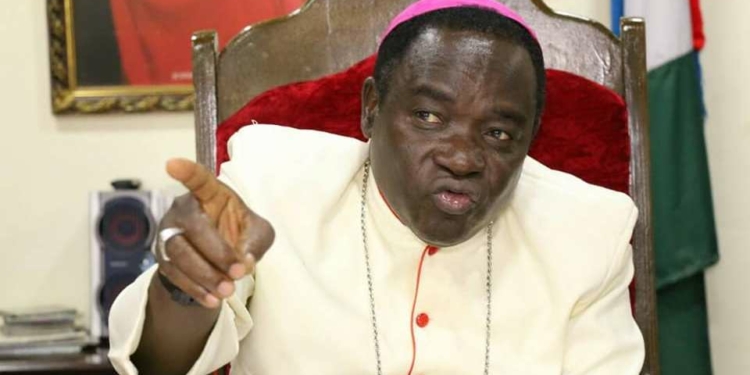- Bishop Matthew Kukah discussed Nigeria’s challenges, emphasizing that even those responsible for the issues don’t find peace, and highlighted the need for purposeful leadership and collective action
- He addressed the importance of addressing the “bread and butter mentality” to enable democracy to thrive and stressed the need for Nigeria to find its unique path to development
In a thought-provoking keynote address at the 3rd annual national public lecture hosted by First News, Bishop Matthew Kukah, the esteemed leader of the Catholic Church in the Sokoto Diocese, offered a candid perspective on Nigeria’s ongoing challenges. The event, titled “The Nigerian Question: Survival of the Federation in The Throes of Increasing Economic Challenges,” took place in Yenagoa, Bayelsa State, and drew attention to the pressing issues facing the nation.
Bishop Kukah emphasized that those responsible for Nigeria’s problems are not immune to the consequences of their actions. He acknowledged that while every country faces its share of difficulties, it falls upon the citizens and purposeful leaders to address these issues collectively.
Kukah remarked, “The good thing about Nigeria is that everybody knows the problems, and the individuals responsible for them are not exempt; they too do not know peace.”
He highlighted the limited opportunities for many Nigerians to explore the world beyond their immediate surroundings due to various troubles. While recognizing that every nation has its unique challenges, Bishop Kukah pondered the essential question: What does Nigeria truly aspire to become? He alluded to the fact that the current global order is the result of over two centuries of exploiting Africa to build prosperous nations. Nigeria, like other nations, must find its own development path.
Addressing the potential of democracy in Nigeria, Bishop Kukah underlined the need for certain fundamental prerequisites to be in place for democracy to thrive. He drew attention to the critical issue of addressing the “bread and butter mentality” currently prevailing in the nation, asserting that democracy may seem like a mere lottery without addressing this fundamental concern.
Mr. Daniel Iworiso-Markson, the publisher of First News, stressed the importance of the lecture in the context of Nigeria’s challenging economic landscape. He expressed concern that the nation’s economic problems persist, seemingly defying conventional solutions. The lecture aimed to foster discussions and explore potential remedies for these pressing economic challenges.
Representing Bayelsa State, Governor Senator Douye Diri, through the Secretary to the State Government, Mr. Gideon Ekeuwei, urged Bayelsa’s residents to focus on self-development as a means of adapting to the ongoing economic situation. This call for personal growth reflects the urgency of the economic challenges that Nigeria faces.
In the midst of these concerns, Bishop Kukah’s insights provide a fresh perspective on Nigeria’s journey toward a prosperous and harmonious future. As the nation grapples with economic hardships and multifaceted issues, his message resonates with the need for collective action, purposeful leadership, and a reimagining of Nigeria’s path to development.










Discussion about this post